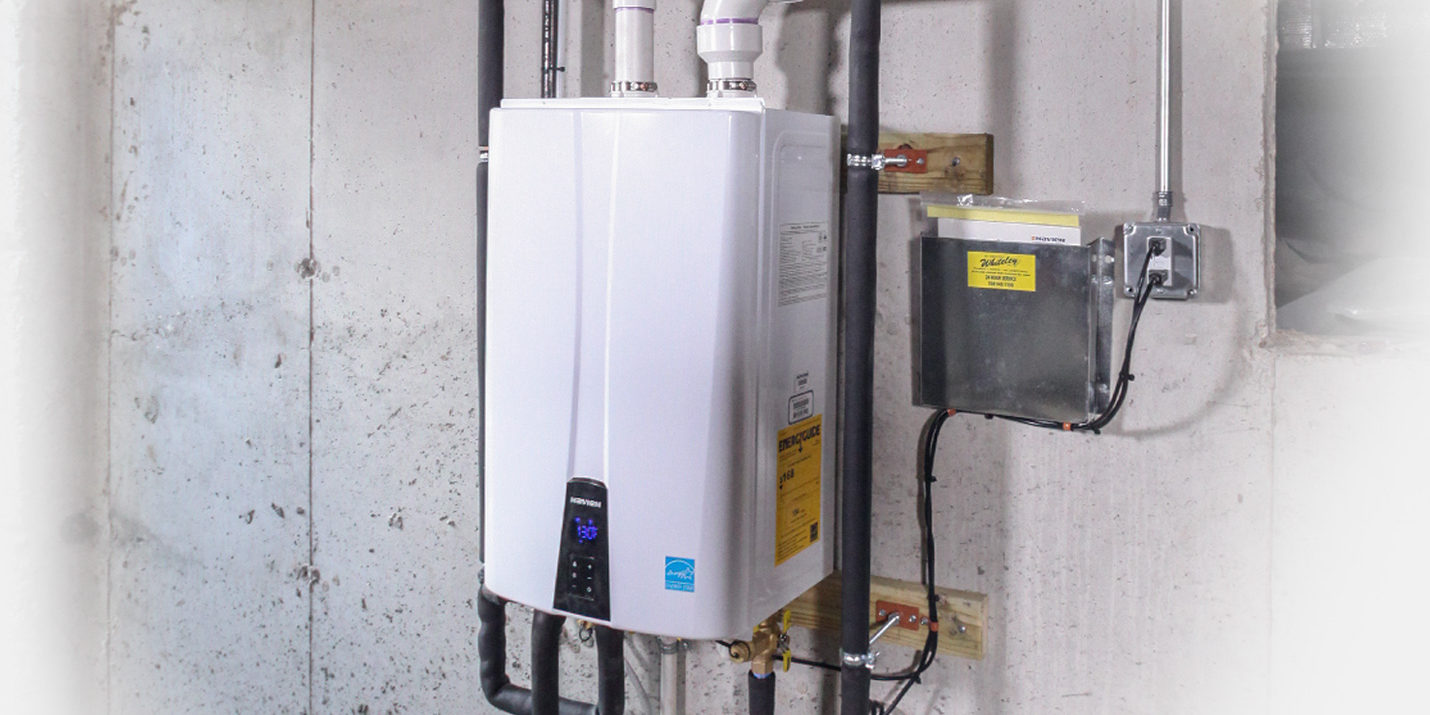Why Continuous-Flow Water Heaters Provide Unmatched Benefits
Why Continuous-Flow Water Heaters Provide Unmatched Benefits
Blog Article
They are making a few good points related to 5 Benefits of Tankless Water Heaters as a whole in the article below.

In a globe where ease and efficiency reign supreme, it's not a surprise that property owners are constantly looking for smarter methods to handle their home's energy intake and convenience. One advancement that has gradually acquired popularity is the tankless hot water heater. Yet what exactly makes these systems stand out from the traditional tank-based designs the majority of us matured with? Let's dive in and explore the benefits of tankless water heaters, aiding you determine if it's time to make the button in your home.
Intro
Picture this: you step into the shower after a long day, anticipating a soothing cascade of hot water, just to be greeted by icy beads because the last individual used all of it up. Sound familiar? Typical hot water heater keep a set quantity of hot water, meaning you're at the mercy of that tank's supply. Tankless systems, on the other hand, warmth water on demand. No more going out mid-shower, no more fumbling with timetables simply to make certain hot water is available.
Understanding Tankless Hot Water Heater
What Are Tankless Water Heaters?
Tankless hot water heater, occasionally known as on-demand or instantaneous hot water heater, offer hot water just as it's needed. Instead of keeping gallons of pre-heated water, these units kick into action the moment you switch on the faucet. Water goes through a warm exchanger, warming up in real-time, indicating you get a continuous flow of warm water without the need for a big storage tank sitting lazily by.
How Do They Differ from Conventional Solutions?
Traditional heating systems hold a reservoir of warm water, using energy to keep that storage tank at a regular temperature level. Tankless systems get rid of the standing supply, lowering thrown away energy and the large footprint of a huge cyndrical tube. Essentially, you're updating from a "accumulation" attitude to a "made-to-order" technique.
Common Types of Tankless Systems
Tankless hot water heater typically can be found in two varieties: gas and electric. Gas models often tend to deliver greater flow prices, ideal for bigger houses, while electrical models frequently offer smaller homes and are normally easier to install. Additionally, some systems are made for point-of-use (serving one fixture) while others can handle the entire home's hot water needs.
Trick Benefits of Tankless Hot Water Heater
1. Unlimited Hot Water Supply
Ever had to schedule showers so everybody obtains their fair share of warm water? With tankless, that comes to be a thing of the past. As long as the heating system's circulation ability isn't gone beyond, you can take back-to-back showers without becoming a popsicle.
2. Energy Performance and Cost Cost Savings
No more heating up a giant storage tank's worth of water and keeping it toasty all day. Tankless heating units reduce standby energy losses, which can decrease utility expenses. While the preliminary price may be greater, the long-term savings frequently validate the financial investment.
3. Space-Saving Style
If your home is short on storage space, getting rid of the cumbersome storage tank liberates valuable area. Tankless systems are portable and can often be mounted on wall surfaces, concealed in corners, or mounted in limited energy storage rooms without hogging the whole space.
4. Longer Life expectancy
A properly maintained tankless hot water heater can outlive its tank-based cousin. Conventional containers could last 10-15 years, while tankless designs can maintain downing along for 20 years or even more, making them a solid financial investment in time.
5. Improved Water Quality
Keeping water in a storage tank can in some cases bring about debris buildup or a slightly "off" preference. With tankless systems, fresh water is heated right away, minimizing the opportunities of debris build-up and potentially using cleaner-tasting water.
Factors to consider Before Switching
Though the benefits are engaging, it's wise to take into consideration a couple of aspects prior to fully devoting.
Initial Investment Prices
Tankless heating units generally come with a higher ahead of time price tag. In between the system itself and prospective installation alterations, the preliminary expense may give you sticker label shock. But bear in mind to watch it as a lasting financial investment.
Setup Needs
Depending on your home's facilities, you may require extra electrical capability or gas line upgrades. Guarantee you understand the installation requirements and consult with a professional to prevent shocks.
Evaluating Your Home's Water Usage Patterns
If your home at the same time makes use of several fixtures with high hot water need, make certain the device's circulation rate fulfills your demands. Recognizing your use patterns aids you choose the best dimension and sort of tankless heater.
Upkeep and Treatment Tips
Tankless systems are relatively low upkeep, but they aren't set-it-and-forget-it devices.
Normal Cleaning and Descaling
Hard water minerals can develop in the warm exchanger, impacting effectiveness. Routine descaling (typically recommended yearly) keeps the system going for peak performance.
Yearly Expert Assessments
A yearly checkup from a specialist makes certain small concerns are captured early. They'll examine the unit's performance, seek leakages, and assist maintain ideal performance.
Making Sure Proper Ventilation
For gas designs, appropriate ventilation is essential to securely expel exhaust gases. See to it airing vent systems are tidy and correctly mounted to avoid any potential safety risks.
Contrasting Different Brands and Versions
Not all tankless hot water heater are produced equivalent.
Looking Into Reliable Manufacturers
Look for reliable brand names with a history of generating high quality units. A dependable maker usually supplies better consumer support and longer guarantees.
Reviewing Testimonials and Individual Feedback
Individual evaluations and comments from next-door neighbors or buddies that have actually gone tankless can offer valuable understandings. In some cases, real-life experiences can be much more informing than advertising and marketing sales brochures.
Installation: DIY or Expert?
While some property owners enjoy tackling tasks themselves, tankless installment might not be the most effective time to break out the toolbox.
Benefits and drawbacks of Do It Yourself Installment
A DIY mount can save money, however it features risks. Incorrect installment can result in ineffectiveness or safety worries. If you're handy and have experience, it might be feasible-- however proceed with caution.
When to Call a Professional Plumber
For a lot of, calling a pro makes sure everything's done appropriately. A specialist plumbing professional understands regional codes, sizing requirements, and venting criteria, lowering the danger of mishaps.
Making best use of Performance
You've invested in a tankless unit-- currently optimize its effectiveness.
Ideal Temperature Setups
Most individuals set their devices between 120-140 F. Readjusting the temperature level can enhance comfort and cost savings. Experiment to locate a wonderful area that doesn't lose power.
Pairing with Low-Flow Fixtures
Wish to stretch your system's capacities? Consider mounting low-flow showerheads and taps. They decrease water use, allowing your tankless system to deliver a consistent stream of warm water without stressing.
Ecological Influence
Tankless water heaters line up with greener living objectives.
Lowered Carbon Impact
By using less power and only heating water as required, tankless systems can lower your home's carbon footprint, reducing your environmental effect.
Conserving Natural Resources
Less energy consumption and less thrown away hot water translate into less natural resources being utilized, an environmental win-win.
Who Benefits Most from Tankless Heating systems?
The elegance of tankless heaters is that they can match a range of houses.
Large Households vs. Solitary Passengers
Huge family members could love the unlimited warm water supply, while solitary occupants appreciate the energy savings from not warming an entire container for simply one person's morning shower.
House Owners with Minimal Area
If your home is short on square footage, shedding the large container frees up area for other essentials-- or maybe simply a lot more breathing space.
Eco-Conscious Customers
Going tankless aligns with eco-friendly values, guaranteeing you're not wasting energy or resources.
Future Fads in Tankless Hot Water Heater
The world of home appliances is ever-evolving, and tankless water heaters are no exemption.
Smart Home Combination
Visualize adjusting your water heater's temperature via an app or obtaining maintenance signals on your phone. As smart home tech developments, we'll see even more connectivity and comfort.
Innovations in Modern technology
R&D is frequently enhancing warm exchangers, making systems a lot more efficient and durable. Future versions may be even quieter, a lot more portable, and better suited for varying climates.
Verdict
Picking a tankless water heater is greater than simply updating your home's hot water system; it's purchasing lasting comfort, energy effectiveness, and a greener lifestyle. By considering your family's water use, bearing in mind installation demands, and devoting to regular maintenance, you can delight in a stable stream of hot water without the luggage of a bulky container. As technology progresses, you can eagerly anticipate even smarter, extra efficient tankless remedies that not just make your life less complicated but additionally benefit the planet.
5 Benefits of Tankless Water Heaters
Save Valuable Space
Since tankless water heaters do not have a massive 40+ gallon tank of water, they are considerably smaller and can fit in more narrow spaces in your home.
If you are working with limited square footage, a tankless water heater will still provide you with the hot water you need while taking up significantly less space in your home. While the exact size of a tankless water heater varies depending on the brand, some are as small as a carry-on suitcase.
Endless Supply of Hot Water
While a traditional water heater preheats and stores your water in the tank, tankless water heaters do not rely on a reservoir system.
This means that they do not run out of hot water like traditional water heaters since they make hot water as needed. Traditional water heaters need to stop and reheat water when the tank inevitably runs out, but tankless water heaters do not have this issue.
Provide Warm Water On-Demand
As mentioned above, tankless water heaters do not preheat a certain amount of water and then store it in a massive tank to be used later. An advantage of installing a tankless water heater includes water being heated instantly whenever you turn on the faucet.
When you turn on the water, it will travel through a heat exchanger in the unit and be heated with either an electric element or a natural gas burner. Gone are the days of having to ration out your hot water to make sure that you do not run out.
Longer Life Cycle
Not only do tankless water heaters provide an endless supply of hot water for your home whenever you want it, but these units tend to have a longer lifespan than water heaters with tanks.
Tanked water heaters have an average lifespan of around 10 years, as the tank is prone to corrosion, leading to serious issues. In comparison, tankless water heaters can last for around 15 to 20 years with the proper maintenance and tune-ups.
Energy Efficient
Compared to traditional water heaters, tankless water heaters are a more energy-efficient water heating option for your home. Tank water heaters must heat and reheat the water stored in the tank throughout the day, even if you are not home.
This energy use adds up over time, leading to an increase in your energy bills and added strain on your unit. A benefit of buying a tankless water heater includes saving money since it only operates when you turn on the hot water. Since it only heats up as needed, this can decrease your energy bills and save you money in the long run.
https://callrandazzo.com/blog/5-benefits-of-tankless-water-heaters/

Hopefully you liked our topic about Unveiling the Hot Trend: The Benefits of Tankless Water. Many thanks for taking a few minutes to read our blog post. Remember to take a moment to distribute this blog posting if you liked it. I value your readership.
Explore Now Report this page